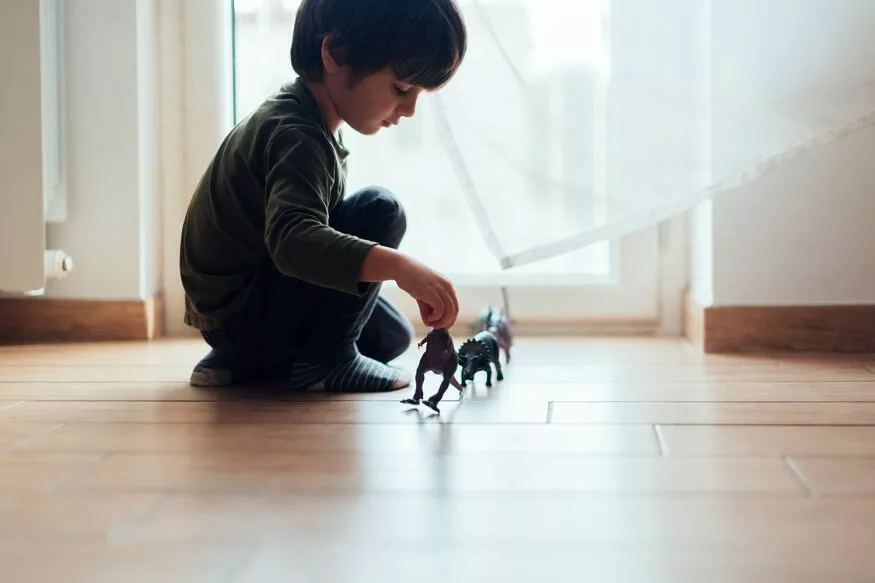Encouraging independent play in children is not just a matter of convenience; it’s a cornerstone of their cognitive and emotional development. In this article, we delve into the importance of independent play, benefits and challenges that may happen in independent play in children.
Understanding Independent Play In Children
Independent play, often termed solitary play, refers to the child’s ability to engage in activities and entertainment without the constant involvement of an adult or playmate. It is a time when a child explores their interests, cultivates creativity, and develops problem-solving skills independently.
Also Read: What Is Peekaboo? How To Play Peekaboo And Its Benefits
Importance and Benefits of Independent Play
Here are some key reasons why independent play is important as well as beneficial for children:
- Creativity and Imagination: Independent play allows children to use their imagination freely. Without the constraints of structured activities, they can invent scenarios, characters, and storylines, fostering creativity.
- Confidence Building: Successfully navigating solo play builds a child’s confidence. They gain a sense of accomplishment and independence when they realize they can entertain themselves and engage in activities without constant guidance.
- Self-Regulation and Patience: Independent play helps children develop patience and self-regulation. They learn to wait their turn, manage their emotions, and entertain themselves without immediate external stimulation.
- Social Skills: Surprisingly, independent play also contributes to the development of social skills. When children play alone, they often engage in self-talk or create scenarios involving imaginary friends, which can enhance their ability to communicate and empathise with others.
- Focus and Concentration: Engaging in solo activities encourages children to concentrate on a task for an extended period. This focus is beneficial for academic and cognitive development, as they learn to sustain attention and complete activities independently.
- Time Management: Through independent play, children begin to understand the concept of time and manage it effectively. They learn to allocate time to different activities and make decisions about how they want to spend their playtime.
- Resilience and Adaptability: Independent play introduces children to the idea that not every moment needs external entertainment. This fosters resilience and adaptability, helping them cope with moments of boredom or unexpected changes in plans.
- Sense of Ownership and Responsibility: Children who play independently often take responsibility for their play space and toys. This instills a sense of ownership and teaches them the importance of tidying up after themselves.
- Enhanced Imagination: Solitary play provides an open stage for the unfolding of a child’s imagination. They can invent characters, scenarios, and entire worlds, fostering a rich inner life that contributes to cognitive and emotional development.
- Boosted Confidence: Accomplishments in independent play, whether completing a puzzle, constructing a tower, or creating a make-believe story, contribute to a child’s sense of accomplishment and boost their confidence.
- Self-Initiated Learning: In the realm of independent play, children often explore topics and activities that intrigue them. This self-initiated learning fosters a love for discovery and builds a foundation for future academic pursuits.
- Development of Communication Skills: Solitary play often involves talking to oneself or creating dialogues for imaginary characters. This self-narration contributes to the development of language and communication skills.
- Resilience and Problem-Solving: Encountering challenges during independent play, such as figuring out how to assemble a puzzle or resolving conflicts in imaginary play, helps build resilience and problem-solving abilities.
Also Read: How To Play Foosball: Rules, Techniques And Scoring
Encouraging Independent Play: Practical Strategies for Parents
Here are some practical tips for parents:
- Create a Playful Environment: Ensure your home has a variety of toys and activities accessible to your child. Arrange them in an inviting way, making it easy for your little one to grab something that catches their interest.
- Rotate Toys: Switching toys in and out can reignite your child’s curiosity. Keep a stash of toys and swap them periodically, so there’s always something “new” for them to discover.
- Start Small: If your child isn’t used to playing independently, begin with short periods. Gradually increase the time as they get more comfortable exploring on their own.
- Model Independent Play: Children often learn by watching. Sit down and engage in a quiet activity by yourself, showing them that solo play can be fun and enjoyable.
- Encourage Creativity: Provide open-ended toys that encourage creativity and imagination. Things like building blocks, art supplies, or dress-up items can inspire hours of independent play.
- Establish a Routine: Consistency can be reassuring for children. Incorporate independent play into a daily routine, creating a predictable time for them to explore on their own.
- Be Supportive: Acknowledge and praise your child when they engage in independent play. Positive reinforcement can reinforce the idea that playing alone is a fantastic and rewarding experience.
- Resist the Urge to Intervene: It’s natural to want to jump in and play with your child, but try to resist the urge. Let them take the lead, even if it means tolerating a bit of mess or unconventional play.
- Provide Safe Spaces: Ensure the areas where your child plays independently are childproofed and safe. This way, you can relax while they explore without constant supervision.
Also Read: Parents know best How you can play and learn at the same time
Navigating Challenges
Here are some common hurdles parents might encounter and suggestions on how to navigate them:
Boredom
- Challenge: Children may express boredom during independent play, leading them to seek constant entertainment.
- Solution: Encourage them to come up with their own activities or provide a variety of toys that spark interest. Teach them that it’s okay to feel bored and that it can be an opportunity for creativity.
Attention Span
- Challenge: Some children struggle to maintain focus for extended periods.
- Solution: Start with short sessions and gradually increase playtime. Offer activities that align with their interests, as this can naturally extend their attention span. Praise them for their efforts, reinforcing positive play experiences.
Transition from Screens
- Challenge: Children accustomed to screen time may find it challenging to engage in non-digital play.
- Solution: Gradually reduce screen time and introduce alternative activities. Offer toys that mimic the interactive aspects of digital games to make the transition more appealing.
Need for Parental Attention
- Challenge: Children might crave parental involvement during playtime.
- Solution: Set clear expectations and boundaries. Explain that there will be dedicated times for independent play and reassure them of your availability afterward. Offer praise and attention when they successfully play alone.
Messy Play
- Challenge: Some forms of independent play can lead to a mess, causing concern for parents.
- Solution: Allow controlled messes within reason. Provide play materials that are easy to clean up, and involve your child in tidying up afterward, teaching responsibility.
Also Read: What Are The Playground Etiquette For Children and Parents
For more blogs on Child Development, read EuroSchool blogs.









